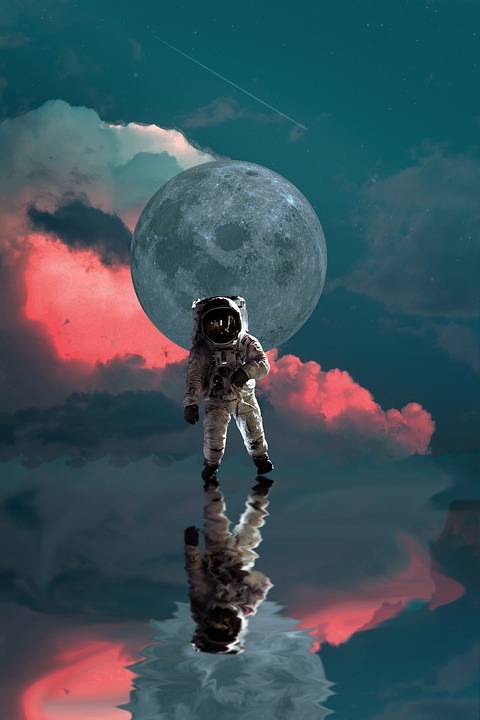Good morning. Boardroom coups are always pretty absorbing; a boardroom coup at a company that has set itself the lofty goal of “building artificial general intelligence (AGI) that is safe and benefits all of humanity” is more absorbing still.
The removal of chief executive Sam Altman from OpenAI, which made the artificial intelligence chatbot ChatGPT, has therefore been the subject of breathless attention since it was announced last Friday. Now Altman has got his job back, and there’s even more to get your head around.
The OpenAI story is a classic boardroom drama – but it’s much more than that. For today’s newsletter, I spoke to technology journalist Chris Stokel-Walker, author of a forthcoming book, How AI Ate The World, about why Altman was forced out, why he came back, and what the saga tells us about who gets to shape the future. Here are the headlines.
Five big stories
-
Israel-Hamas war | Israeli officials have said a four-day Gaza truce and hostage release will not start until at least Friday, stalling a breakthrough deal to pause the bloody seven-week-old war and thwarting the hopes of families that some captives would be freed on Thursday.
-
Autumn statement | Jeremy Hunt sought to blunt the impact of the highest levels of taxation since the second world war with a cut in workers’ national insurance contributions, fuelling speculation about a snap spring general election. The chancellor used a fresh squeeze on public spending to pay for a reduction in NICs worth £450 a year to the average employee. See the key points and what it means for you.
-
Netherlands | Geert Wilders’ far-right, anti-Islam Party for Freedom (PVV) is on course to be the largest party in the Dutch parliament, according to exit polls, in a major electoral upset whose reverberations will be felt around Europe. The PVV was predicted to win 35 seats in the 150-seat parliament, but may not be able to form a governing coalition.
-
Covid inquiry | Prof Sir Jonathan Van-Tam and his family were advised by police to move out of their home during the pandemic because of a threat that they would have their throats cut, he has told the Covid inquiry. Van-Tam said that he feared the scale of such abuse would put people off taking up similar roles in the future.
-
US and Canada | Four border crossings between the US and Canada were closed on Wednesday after a vehicle exploded at a checkpoint on a bridge near Niagara Falls, reportedly killing two people. Governor of New York Kathy Hochul said there was “no indication of a terrorist attack”.
In depth: ‘OpenAI is essentially Sam Altman now, through the messianic following he’s engendered’
Here’s what just happened, sorry for the long paragraph:
On Friday, Sam Altman was abruptly fired by the board of OpenAI because he had not been “consistently candid in his communications”, and chief technology officer Mira Murati was named as interim chief executive. On Sunday, amid widespread dismay among staff and investors, Altman and a group of allies held hours-long negotiations over his possible return, but by the end of the day, a new permanent chief executive, Emmett Shear, had been appointed. On Monday, Altman was hired to run a new AI unit at Microsoft – which owns 49% of OpenAI. Meanwhile, staff wrote an open letter to the OpenAI board saying that they would quit and join Altman at Microsoft unless he was reinstated; ultimately, about 750 of 770 staff signed. Late on Tuesday night US time, Altman was reinstated, his opponents on the board were replaced, and Microsoft said it was happy with the outcome. And yesterday, ousted board member Helen Toner said: “We all get some sleep.”
Here’s what all that means, and whether or not you should be any more worried about being squished by a computer than you were a week ago.
What made OpenAI different
The exact nature of Altman’s alleged lack of candour has not been made public, but reporting in the days since he got the boot suggests that it came down to a fundamental feature of OpenAI’s corporate structure, almost unique among its peers: it has a nonprofit board – tasked with ensuring the company develops AI for the benefit of humanity above its investors – in charge of a for-profit company. (Those profits are still capped, though, at 100 times the initial stake for first-round investors; any excess goes back into the nonprofit.)
Altman is one of those who designed the set-up that ousted him. In theory, it should have preserved the idealistic intentions of the company’s origins as a research lab while allowing the dizzying investment needed for any major AI player. Still, that balance is an expression of a fundamental tension in AI: how do you develop a world-changing technology at a competitive pace while mitigating the risks that the profit motive is bound to entail?
In practice, though, Altman’s removal suggests the limits of that model. “Having a check and a balance on the for-profit side isn’t necessarily impossible, but it has been so dysfunctional that it just didn’t work,” said Chris Stokel-Walker. “If you want to compete, you have to go into the market for investment, and that is going to shape how you think about things. You might want to develop a slow-moving, carefully crafted company that is focused on safety, but if a massive investor says that it needs something from that, do you have the spine to say no?”
The ‘great man’ problem
However stupidly, tech companies are often reduced to the influence of a single wunderkind (Jobs, Zuckerberg, Musk, Alan Sugar). The problem for the board of OpenAI was that it failed to recognise something that seemed pretty obvious to everyone else: Altman was one of those guys, and the company was worthless without him.
There are good reasons to question whether that should be true, or whether anyone should be treating OpenAI’s fate as a big deal anyway. As Max Read points out, it is “one of many A.I. companies working on fundamentally similar technologies” whose transformative potential is yet to be realised; Altman himself “has never demonstrated a particular talent or vision for running a sustainable business”. Even so, he comes out of the week far more powerful than he went into it.
“It turns out that OpenAI is essentially Sam Altman now – we’ve seen that through the messianic following he’s managed to engender among his employees,” Chris said. “Silicon Valley is obsessed with troubled geniuses. The problem of a lot of the discussion of what happened is that it inevitably lionises this idea of a single, invariably male, godlike figure who can make the weather and dictate every big decision. And so you have the psychodrama of the interpersonal conflicts, but much more fundamental questions get overlooked.”
The risks of AI and managing them
You will be familiar with the darkest fear about artificial intelligence, the sort of thing you briefly contemplate over breakfast before choosing to focus on your muesli: the idea that it could ultimately be powerful and uncontrollable enough to pose an existential threat to humanity, and enslave or make mincemeat of us all.
The most apocalyptic versions of that concern are, in truth, “a very niche belief within the industry”, Chris said – but there are many ways that the technology could cause harm that fall short of humanity’s extinction, from ubiquitous misinformation to the hollowing out of industries that employ millions.
One urgent concern, Chris said, “is that AI is already trained on biased data – on the majority of the internet which is English language, middle class, male, from economically developed countries”. Altman himself has been cautious in the past about some of the risks – one of the reasons his company is set up the way it is. OpenAI now looks like evidence of how difficult it is to keep guardrails in place even at a company notionally devoted to their maintenance. Meanwhile, Meta just broke up its “Responsible AI” team.
What OpenAI and the industry look like today
It’s pretty hard to imagine a more bungled boardroom coup than the one that ultimately saw Altman back in his job, and more secure in it than ever. The composition of the new board suggests it is likely to be more focused on the company’s business interests, and less preoccupied with safety concerns, though its members are governed by the same nominal “humanity over investors” rules as their predecessors. “But the barrier to intervening again is very high,” Chris said. “I doubt we’re going to see another coup in a week.”
AI will keep trucking on and keep freaking everyone out whether or not OpenAI succeeds. Even if the company’s fate is mostly a matter of significance to the people invested in it, though, there are wider implications. “OpenAI’s board got almost everything wrong,” Platformer’s Casey Newton notes, “but they were right to worry about the terms on which we build the future, and I suspect it will now be a long time before anyone else in this industry attempts anything other than the path of least resistance.”
—
To keep up to date with all the latest developments in the AI apocalypse sign up here to our weekly technology newsletter, TechScape.
after newsletter promotion
What else we’ve been reading

-
In further AI news, Suzanne Wrack writes about Hope Songi, an artificial intelligence-created expert who hopes to be the first female Fifa president. Created using the voices and ordeals of trailblazing women in the sport, Sogi aims to challenge the “broken” game and advance women. Nyima Jobe, newsletters team
-
Michael Stone was first found guilty of the brutal murders of Lin and Megan Russell in 1998, but while he was monstered in the press, there have always been doubts about the safety of his conviction. Sirin Kale speaks to Stone, examines the evidence and asks: have they got the wrong man? Clare Longrigg, acting head of newsletters
-
America faces an isolation epidemic, as more Americans approach 30 feeling lonelier than ever. To combat this, Matthew Cantor writes here about the startup Groundfloor and its “after school club” for over-30s. Nyima
-
Mental health recovery can be a fine balancing act between pushing oneself to the limit and being more forgiving. Anna Britton, who lives with PTSD, describes the moment when, out kayaking, she allowed the exhausting emotions that come with living with PTSD to surface – and resolved to live life to the full. Clare
-
More consumers are buying faux leather clothes with the assumption it is an ethical choice. This piece by Tamsin Blanchard explains why that isn’t the case. Nyima
Sport

Tennis | A London council has rejected the All England Club’s plans to build a new 8,000-seat stadium and 38 further tennis courts on a Grade II*-listed park in Wimbledon. Merton council, which has an equal say, previously approved the plans by 6-4. The London mayor’s office has said it will decide in the next fortnight whether to kill the plans entirely or call them in for review.
Football | Barcelona survived a scare in the Women’s Champions League as the holders battled back from a goal down to defeat Eintracht Frankfurt 3-1 thanks to two goals from Salma Paralluelo (above).
Football | Barnsley have been kicked out of this season’s FA Cup for fielding an ineligible player in their first-round replay win at non-league Horsham, who have been reinstated to the competition. The player, Aiden Marsh, was ineligible because he had been on loan at York during the initial match.
The front pages
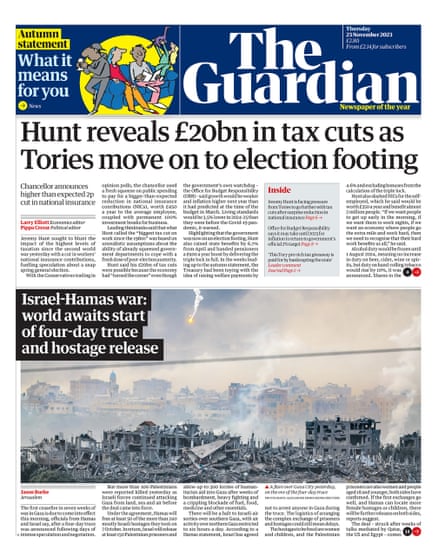
“Hunt reveals £20bn in tax cuts as Tories move on to election footing” – so runs the Guardian front-page splash headline this morning. “We’ve delivered on triple lock to protect you” is the message to pensioners, says the Daily Express. “Hunt eases tax burden” says the Times. The Daily Telegraph hails the “Biggest tax cuts since the 1980s” and the Daily Mail uses the same words, thought it follows up thusly: “But with total burden still vast … Let’s hope it’s just the start!”. Others scratch the surface a bit harder. “Tax burden to hit record high despite 2p cut for millions” – that’s the i while the Financial Times has “Tax burden surges despite Hunt cuts”. The Daily Mirror is not at all entertained, calling it all “swizz”: “Do they take us all for fools?” It mounts the argument that millions will be worse off. The Sun bigs up the tax cut – “New year’s wahey!” – then adds in much finer print: “But taxes will still be highest since WW2”. “Happy NI year” –that’s the Metro, and the NI stands for national insurance, in case you wondered.
Today in Focus
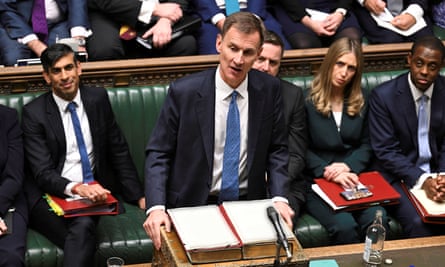
Can tax cuts save the Tories?
Jeremy Hunt has offered up sweeping tax cuts in an attempt to jolt the UK economy back to life and salvage his party’s hopes of staying in power beyond the next election. Heather Stewart reports
Cartoon of the day | Ben Jennings
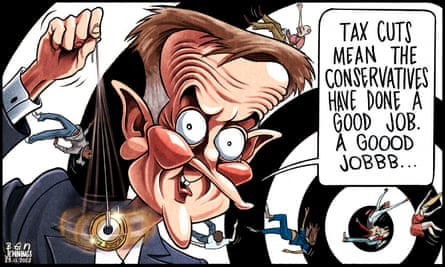
The Upside
A bit of good news to remind you that the world’s not all bad
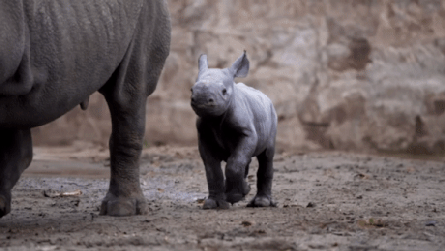
One of the world’s rarest mammals, the eastern black rhino, has welcomed a new arrival – with Zuri giving birth to a female calf in Chester zoo after a 15-month pregnancy.
“So far, the pair have been inseparable,” said the zoo’s rhino team manager, Emma Evison, “and the little one is feeding regularly and already gaining in size and weight. She’s very inquisitive and full of energy, which is just brilliant to see.”
Fewer than 600 eastern black rhinos exist across Kenya, Tanzania and Rwanda. Chester Zoo is a leading partner in a European endangered species breeding programme. Evison said: “This precious newborn’s arrival is another positive step in safeguarding the species.”
Sign up here for a weekly roundup of The Upside, sent to you every Sunday
Bored at work?
And finally, the Guardian’s puzzles are here to keep you entertained throughout the day – with plenty more on the Guardian’s Puzzles app for iOS and Android. Until tomorrow.









